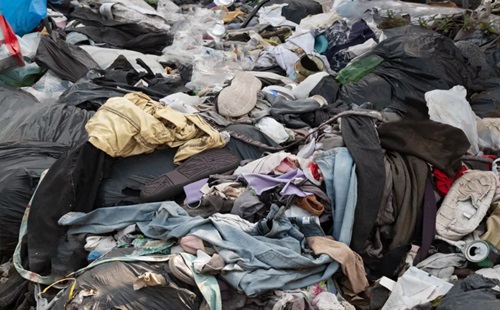
Group urges government to ban import of 'Broni w'awu'
A leading environmental group has called on the Ghanaian government to ban the importation of second hand clothing commonly referred to as "foss," "broni wawu" or "bend down boutique" and textile waste from the global north, warning of the severe environmental and health risks these imports pose.
Speaking at the launch of a report titled “Fast Fashion, Slow Poison: The Toxic Textile Crisis in Ghana,” Hellen Kahaso Dena, Project Lead of the Pan-African Plastics Project, highlighted the dangers of importing textile waste, which often contains harmful chemicals that can contaminate soil and water, disrupt ecosystems, and damage public health.
Related Articles
From ‘Kantamanto’ to Instagram • ‘Foss’ goes online
Used clothing dealers reduce prices by 30 per cent
Obroni Wawu October • Celebration of second-hand clothing, kantamanto
“Ghana is drowning in fast fashion waste,” Madam Dena said at the event organised by Greenpeace Africa in Accra. She urged the government to take immediate action by banning unusable clothing imports and promoting sustainable local textile industries.
According to Dena, much of the imported clothing classified as “used” is in fact unusable waste, misclassified to avoid regulations on waste exports.
She condemned the practice, noting that Africa has become a dumping ground for Europe’s unwanted textiles, with devastating effects on the environment and public health.
“We want the government to enact laws ensuring only resellable and usable clothing is imported,” she said.
She also called for the implementation of the ‘Polluter Pays Principle,’ pushing the Global North to take responsibility for the damage caused by the international trade in used clothing.
Mr. Sam Quashie-Idun, Head of Investigations at Greenpeace Africa, shared alarming statistics about the trade in second-hand clothes. He revealed that 7.5 million articles of old clothing arrive at Accra’s Kantamanto Market each week, with half being of low quality and made from synthetic fibres. Stallholders estimate that up to 60% of these items are unsellable and often end up in informal dumps or are burned, releasing hazardous chemicals.
"Our people, our rivers, and our beaches are choking," Mr. Quashie-Idun said, stressing the urgent need for action to address what he called “waste colonialism,” a system that disrespects African lives and the environment.
The group is calling for international legislation, similar to ongoing discussions on plastic pollution, to tackle the issue of textile waste globally.
